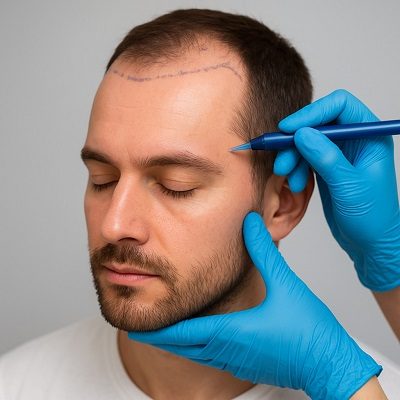
Natural Hairline, Fuller Look!
One of the main points of a Sapphire FUE Hair Transplant in Islamabad is the recreation of a natural hairline; thus, the addition of more volume and the subtle and elegant final look comes as a result of the first point. At Glamorous Aesthetic Clinic, we offer advanced FUE procedures with our dedicated surgeons who mainly emphasize precision, safety, and a natural-looking result.It is certainly a fact that many advertisements worldwide have been promoting the Sapphire FUE method; however, patients are often puzzled by the hype. Is it really better? Can it give more density? Why are sapphire blades so popular?
This page clears up everything, without any exaggerations, marketing myths, and with a focus on medical accuracy and patient education.
QUICK FACTS:
- Technique: Sapphire FUE
- Duration: 5–8 hours
- Anesthesia: Local
- Downtime: 3–5 days
- Visible Healing: 7–12 days
- Shedding Phase: 2–6 weeks
- New Growth Starts: 3–4 months
- Final Density: 10–12 months
- Pain Level: Minimal
- Suitable For: Male & female pattern hair loss, scars, hairline lowering
What Is Sapphire FUE?
The term Sapphire FUE stands for a method of Follicular Unit Extraction where the doctor performs incisions using sapphire crystal blades instead of the commonly used stainless steel ones. The rest of the FUE Hair Transplant method is the same:
- The grafts are removed one by one
- Micro channels are opened in the recipient area
- Grafts are inserted in these channels
The only difference between them is the material of the blade, which is used for making the canal.
We carry out Sapphire FUE in our center with ultra-precise, polished sapphire blades, which are designed to make smooth and even incisions.
Why Is There So Much Hype Around Sapphire Blades?
The Word Sapphire Sounds Luxurious:
Just the term alone brings to mind an image of a top-notch product. Many clinics consider Sapphire FUE as a luxury upgrade, even though the doctor is the one who matters the most, not the blade.
Sapphire Is a Harder Material:
Sapphire is more resistant than steel. It can retain its sharpness for more cuts. Nevertheless, surgeons still change their blades regularly during operations.
Claims About “Less Tissue Damage” Are Overstated :
If the size of the blade is the same, both sapphire and steel will cut:
- The same layers of skin
- The same amount of tissue
- The same depth
There is no substantial clinical evidence that less trauma occurs solely because of the material.
Sapphire Blades Do Not Reduce Shock Loss:
Sapphire Blades Do Not Reduce Shock Loss:
The reasons for shock loss prevention are:
- Proper spacing
- Correct angle
- Gentle technique
The material of the blade cannot stop follicles.
Both Can Create High Density:
At times, modern stainless steel blades can be as thin or even thinner than sapphire. Density is a matter of:
- Incision direction
- Surgeon skill
- Graft size
- Tumescence
Not the mineral the blade is made of.
Real Advantages:
Sapphire has a very smooth, almost glass-like surface, which can easily slide over:
- Thick scalp skin
- Fibrous tissue
- Old scarred areas
- This is the truest advantage.
Marketing Trend Across Clinic:
Sapphire FUE was the trend that came about because clinics needed to find a way to differentiate themselves. Most of the hype is due to branding rather than significant medical differences.
Sapphire FUE vs Standard Steel Blade FUE:
Here’s the comparison between Sapphire FUE and Standard Steel FUE:
| Features | Saphire FUE | Standard FUE |
| Blade Material | Saphire crystal | Stainless steel |
| Sharpness Duration | Longer | Gets dull faster |
| Incision smoothness | Very smooth | Smooth but may roughen when used |
| Density capability | Same | Same |
| Tissue Trauma | Same | Same |
| Healing speed | Similar | Similar |
| Best for | Thick skin, fibrous area, premium finish | All standard cases |
| Cost | Higher | Lower |
Sapphire FUE Procedure in Islamabad:
We carry out a socially responsible, medically accurate, and globally accepted protocol for Sapphire FUE:
Consultation & Hairline Design:
Consultation Includes:
- Detailed examination of the scalp
- Density mapping
- Hairline drawing corresponding to the patient’s age
- Discussion of the expectations
Donor Area Preparation:
- Trimming the donor area
- Cleaning and disinfecting
- Local anesthesia for pain relief
Graft Extraction:
The removal of grafts one at a time with the help of a micro-motor or manual punch (depending on the case) while:
- Roots are kept intact
- Grafts are kept hydrated
- Grafts are cooled to increase their survival
Channel Creation Using Sapphire Blade:
This is the place where the usage of a sapphire comes.
To create channels, the surgeon makes use of a polished sapphire blade at the exact:
- Angle
- Depth
- Direction
- Spacing
- Required for the most natural results.
Graft Implantation:
The grafts are implanted in the recipient areas by the following:
- Implanter pens, OR
- Forceps (depending on hair typFinal Assessment & Dressing:
- Cleaning
- Light bandaging (if necessary)
- Post-care instructions
Before Care (Pre-Procedure Instructions)
Those patients who wish for quick healing and maximum graft survival ought to:
- Stop Smoking 7 Days Before: Nicotine causes the narrowing of blood vessels and thus the process of healing slows down.
- Avoid Blood Thinners: If you are not taking them for a specific medical condition, then you should avoid aspirin, ibuprofen, and supplements such as omega-3.
- No Alcohol 48 Hours Before: Alcohol contributes to making bleeding more than usual.
- On the Day of the Operation, the Patient Should Wash His Hair Normally
- Eat a Light Breakfast. Avoid heavy meals and energy drinks.
- Inform the Surgeon About Medication You Are Taking, If Any.
After Care (Post-Procedure Instructions):
Keep in mind these instructions after the procedure:
| Timeline | Aftercare Instructions |
| Day 1–3 | Keep the scalp dry Do not touch the grafts Sleep with your head elevated |
| Day 3–12 | Start gentle washing as instructed Spray saline several times a day If you do not want to sweat, then you should not go to the gym or steam rooms |
| 2 Weeks – 1 Month | The crusts come off The condition of itching is normal Do not scratching |
| 1–3 Months | Temporary shedding takes place Slowly, new growth starts |
| 4–12 Months | Hair gets thicker, mature, and more voluminous |
| Final results at 12 months | You’re recovered properly and can enjoy thicker new hair. |
Cost Of Sapphire FUE Hair Transplant:
The cost of a Sapphire FUE Transplant depends on graft count, scalp condition, and density plan. Here’s a breakdown:
| Type of Hair Transplant | Cost in PKR |
| Cost of Saphire FUE | Rs 150,000 – 400,000 |
| Cost of Standard FUE | Rs 100,000 – 300,000 |
Factors Affecting The Cost:
Some factors may affect the cost of a sapphire FUE Hair Transplant, they are:
- Number of grafts required
- Techniques used
- Experience of the surgeon or doctor
- Clinic residency or location and reputation
- Density plan
- Scalp condition
Why Choose Glamorous Aesthetic Clinic?
- We give you the best possible services of a clinic with:
- FUE protocols that comply with international standards
- Hairlines that are not only natural and soft but also artistically create
- Strict safety and hygiene measures
- Surgeries are the result of the work of surgeons (not unskilled technicians)
- Complete post-care support including follow-ups and consultations
Best Surgeon For Saohire FUE Hair Transplant In Islamabad:
Success of a hair transplant at Glamorous Aesthetic Clinic is all about the attributes of skill, precision, and experience.
Doctor Ahmed:
He’s the one who gets the most credit, as he is a top-notch Follicular Unit Extraction (FUE) specialist and is the most preferred doctor by the patients for his natural and long-lasting results.
In fact, Dr. Ahmed has experience of many years in both Sapphire FUE as well as regular FUE and thus, he can customize the transplantation accordingly to the patient’s scalp condition, hair type, and aesthetic goals. To achieve a smooth and natural-looking result, he concentrates on natural hairline design, optimum graft density, and accurate placement.
Dr. Ahmed’s style is more like a patient-centered one, and at the same time, he is very detail-oriented. He starts with a comprehensive consultation, inspects the donor and recipient areas, and gives the patient an idea of what to realistically expect. At the time of the operation, he performs the incisions very slowly and in a very small area, and also the grafts are handled and done very gently so, the survival rate is kept high while the tissue trauma is low.
For anyone considering FUE hair restoration, Dr. Ahmed combines technical expertise, artistic vision, and compassionate care, making him the ideal choice for achieving natural-looking, high-quality results.
FAQ,S OF Sapphire FUE Hair Transplant:
Does Sapphire FUE hurt less?
Both methods are done under local anesthesia. The level of pain is quite the same.
Does Sapphire FUE heal faster?
The time needed for healing is almost the same for both methods.
Does Sapphire FUE give more Density?
Density is determined by the angle of the incision, the distance between the hairs, and the size of the grafts - not by the material of the blade.
Who is the ideal candidate?
The ideal candidates would be those suffering from pattern baldness, thinning hair, receding hairline, or the ones that need scar concealment
When will the results appear?
The first signs of new hair will be seen at 3–4 months. Full results take 10–12 months.
Is Sapphire FUE more expensive?
In most cases, the answer is yes. The blades are more expensive, and the clinics market them as a luxury service.
What age is ideal for a hair transplant?
Usually 25 years or older, once hair loss stabilizes.
How long does the procedure take?
Typically 4–8 hours ,depending on grafts and area.
Conclusion!
Both techniques can deliver great results when performed by a skilled professional. The Sapphire FUE Hair Transplant in Islamabad provides greater comfort and smoothness of the incision, but ultimately, it is the surgeon, not the blade, who decides the outcome.
Introduction: Dr. Annas Sani is a highly motivated and compassionate physician with a strong background in internal medicine, general practice...
Introduction: Dr. Mehwish Asad is an Aesthetic and General Surgeon, a motivated and hardworking specialist, enthusiastic about medical services...
At our clinic we introduce you to our certified and professional Dr Nadia Tariq, a well known plastic and reconstructive surgeon and aesthetician...
At our clinic we introduce you to our certified and professional Dr Nadia Tariq, a well known plastic and reconstructive surgeon and aesthetician...
We proudly introduce you to our certified and highly skilled Dr. Fabiha Abid, a renowned physiotherapist and aesthetician providing...
At our Glamorous Clinic, we proudly announce our medical professional Dr. Samra Liaquat, an experienced dental surgeon and aesthetic...

Dr.Annas Sani


Dr. Mehwish Asad


Dr. Ahmed Ali


Dr. Nadia Tariq


Dr. Fabiha Abid


Dr. Samra Liaquat




